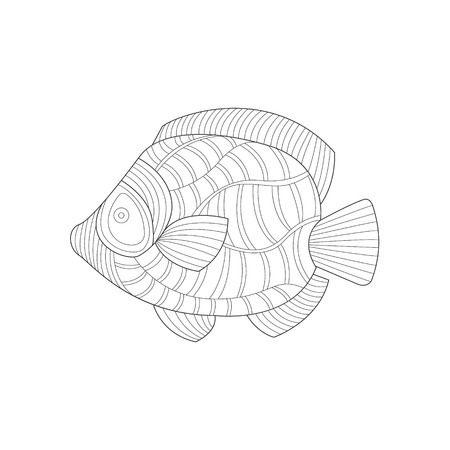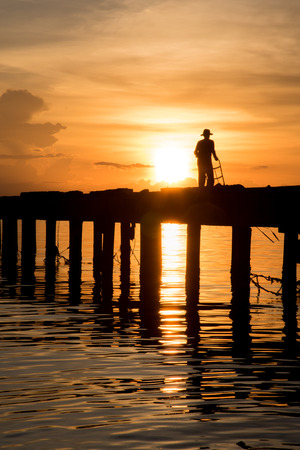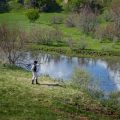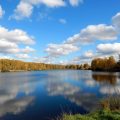Introduction to Coarse Fishing in Wales
Coarse fishing, a quintessentially British pastime, has cemented its place as a favourite outdoor pursuit across the United Kingdom. In Wales, this tradition is not merely a hobby but a vibrant part of local culture, drawing both seasoned anglers and newcomers alike to the banks of its scenic rivers. Unlike game fishing, which targets species such as salmon and trout, coarse fishing focuses on freshwater fish like bream, roach, perch, and barbel. The popularity of coarse fishing in Wales can be attributed to its accessibility, the diversity of species available, and the picturesque landscapes that frame each angling adventure. Welsh rivers offer a unique experience for anglers due to their clean waters, varied flow conditions, and rich biodiversity. From tranquil backwaters to fast-flowing stretches, every river boasts its own charm and challenge. The table below highlights some key features that set Welsh rivers apart for coarse fishing enthusiasts:
| Feature | Description |
|---|---|
| Diverse Species | Home to native and stocked coarse fish including chub, dace, carp, and tench. |
| Scenic Settings | Surrounded by rolling hills, ancient woodlands, and rural tranquillity. |
| Accessibility | Many rivers are easily reached by road or footpaths with designated angling spots. |
| Year-Round Opportunity | Open seasons and mild climate allow for extended fishing periods throughout the year. |
The allure of Welsh coarse fishing lies not only in the abundance of fish but also in the immersive experience it offers—one where nature and tradition meet. Whether you are looking for peaceful solitude or competitive sport, the rivers of Wales provide a memorable setting for every angler.
2. Essential Tackle for Welsh Rivers
When coarse fishing in the rivers of Wales, choosing the right tackle is crucial to maximise your chances of a productive session. The unique conditions—ranging from swift-flowing mountain streams to slower, meandering lowland rivers—demand specific gear that can cope with changing depths, water clarity, and local species. Below is a detailed rundown of recommended rods, reels, lines, and bait tailored to the Welsh river environment.
Rods: Length and Power Matter
Welsh rivers are often flanked by overhanging trees or steep banks, so a rod between 11ft and 13ft offers the best compromise between casting reach and manoeuvrability. For float fishing on rivers like the Wye or Taff, opt for a lightweight match rod with sensitive action; for heavier ledgering in deeper waters such as the River Severn, a medium feeder rod is ideal.
Recommended Rods Table
| Rod Type | Length | Best Use | Example Rivers |
|---|---|---|---|
| Match Rod | 12ft–13ft | Float Fishing | Taff, Dee |
| Feeder Rod | 11ft–12ft | Ledgering/Feeder Fishing | Severn, Wye |
| Travel Rod (Telescopic) | 9ft–11ft | Tight Spaces/Mobile Angling | Afon Glaslyn, Usk tributaries |
Reels: Smooth and Reliable Performance
The fast currents and varied fish sizes in Welsh waters call for reels with smooth drag systems and robust construction. A 3000-4000 size fixed spool reel is versatile enough for most situations. Choose models with anti-reverse features and corrosion-resistant components to handle both chub runs and barbel surges common in Wales.
Top Reel Choices for Welsh Rivers
- Daiwa Ninja LT 3000: Lightweight, reliable drag; excellent line lay for float work.
- Shimano Baitrunner ST 4000: Perfect for ledgering and targeting larger specimens like barbel or carp.
- Mitchell Avocet RZ: Budget-friendly without compromising performance.
Mainline: Match Strength to Conditions
The rocky beds and submerged snags of Welsh rivers require abrasion-resistant lines. For float fishing, a monofilament line of 4lb–6lb breaking strain strikes the right balance between stealth and strength. When feeder fishing or targeting larger species, step up to an 8lb mainline—braided lines can be considered where regulations allow.
| Mainline Type | Poundage (lb) | Best Use Case |
|---|---|---|
| Monofilament (Clear) | 4–6lb | General Float Fishing – Roach/Dace/Chub |
| Braided Line (Green) | 8–10lb+ | Feeder/Ledgering – Barbel/Bream/Carp |
Bait: Matching the Menu to Local Fish
Bait selection can make or break your day. In Wales’ clear waters, natural baits often outperform artificial options. Here’s what works best:
- Maggots & Casters: Go-to choice for dace, roach, and chub on most Welsh rivers.
- Lobworms & Nightcrawlers: Irresistible for perch, eels, and specimen chub—especially after rain when rivers rise.
- Sweatcorn & Breadflake: Top picks for bream and tench on slower stretches.
- Pellets & Paste: Increasingly popular for barbel on the Wye or Severn; use in conjunction with a feeder.
Tackle Checklist Summary Table
| Tackle Item | Specification (Suggested) |
|---|---|
| Rod | 11–13ft Match/Feeder Rod (Sensitive Tip) |
| Reel | 3000–4000 Size Fixed Spool (Smooth Drag) |
| Mainline | 4–8lb Mono/Braid (Abrasion Resistant) |
| Bait Selection | Maggots, Worms, Sweetcorn, Pellets/Paste (as per target species) |
Selecting appropriate tackle ensures you’re well-prepared for the diverse challenges posed by Welsh rivers—whether you’re stalking wild grayling in upland streams or ledgering for powerful barbel in broader valleys. Equipping yourself properly not only improves your catch rate but makes every outing safer and more enjoyable amidst Wales’ stunning scenery.

3. Top Welsh Rivers for Coarse Fishing
Wales is famed for its stunning waterways, many of which offer prime conditions for coarse anglers seeking variety and trophy catches. In this section, we deliver an in-depth review of the most celebrated rivers across Wales, focusing on what makes each unique and why they continually attract both local enthusiasts and visiting anglers from across the UK.
River Wye
The River Wye stands out as one of Britain’s premier coarse fishing destinations. Meandering through picturesque valleys, it is particularly renowned for barbel, chub, and pike. The river boasts healthy fish stocks, diverse habitats, and accessible stretches managed by angling clubs and fisheries. Its clarity and flow make it ideal for float and ledger tactics alike.
River Towy
Famed primarily for its magnificent sea trout (sewin), the River Towy is also a hidden gem for coarse anglers. The lower reaches host impressive shoals of dace and perch, while the slower sections upstream are home to specimen chub. Local bylaws often change with the season, so always check before heading out.
River Severn
The mighty Severn originates in mid-Wales before winding into England, offering a wealth of coarse angling opportunities along its Welsh length. Here you’ll find excellent catches of roach, bream, and eels, particularly around deeper pools and slow bends near towns like Newtown and Welshpool.
Other Noteworthy Rivers
- River Dee: Bordering North Wales, the Dee is noted for grayling but also provides solid coarse sport with dace, chub, and perch.
- River Usk: More commonly associated with game species but holds some superb wild coarse fish in its lower reaches.
Comparison Table: Top Coarse Fishing Rivers in Wales
| River Name | Main Coarse Species | Best Locations | Access & Facilities |
|---|---|---|---|
| Wye | Barbel, Chub, Pike | Builth Wells, Hay-on-Wye | Day tickets, good parking |
| Towy | Dace, Perch, Chub | Carmarthen to Llandeilo | Local permits required |
| Severn | Roach, Bream, Eel | Newtown, Welshpool | Syndicate & club waters available |
| Dee | Dace, Chub, Perch | Llangollen area | Easily accessible pegs |
This overview demonstrates that whether you’re targeting powerful river barbel or enjoy float-fishing for silvers amidst scenic backdrops, Wales offers a river to match every angler’s ambition. Each waterway presents unique challenges and rewards—making them essential additions to any coarse fisher’s itinerary.
4. Favourable Species and the Best Times to Fish
Wales is a haven for coarse anglers, boasting a rich diversity of species thriving in its rivers. Each river presents its own blend of habitats, supporting everything from hard-fighting barbel to elusive chub. Understanding which species dominate each waterway—and when they are most active—will help you plan more productive sessions. Here’s a detailed analysis of the main coarse fish found in Welsh rivers, along with expert insight on seasonal trends and ideal conditions.
Main Coarse Species in Welsh Rivers
| Species | Best Rivers | Prime Season | Ideal Conditions |
|---|---|---|---|
| Barbel | River Wye, River Taff | June – October | Mild weather, steady flows after light rain |
| Chub | River Usk, River Dee | September – February | Clear water, overcast skies, moderate flow |
| Dace | River Wye, River Severn (Welsh stretch) | October – March | Crisp winter days, moderate clarity |
| Pike | Llangollen Canal, Lower Wye | November – March | Cold water, low light conditions |
| Bream | River Towy, River Teifi (lower reaches) | April – July | Mild spring weather, slow-moving stretches |
| Perch | River Dee, Llynfi Dulas | Year-round (best in autumn) | Low flow, abundant cover (e.g. overhanging trees) |
| Tench* | Lakes connected to rivers (e.g. Llyn Tegid) | May – August | Warm evenings, calm water near weed beds |
| *Tench are more commonly found in stillwaters but are present in some slow-flowing river margins or adjacent lakes. | |||
The Seasonal Rhythm: When to Target Each Species?
The coarse fishing calendar in Wales is defined by both legal restrictions and natural cycles. For instance, the traditional close season for rivers (15th March – 15th June) limits access during peak spawning times for many species. However, outside these dates:
- Early Summer (June): Barbel and bream become highly active as water temperatures rise.
- Late Summer to Autumn: Chub and perch feed heavily before winter sets in; this period often sees fewer anglers and clearer waters.
- Winter: Dace and pike thrive in colder conditions—ideal for specimen hunting when riverbanks are quieter.
Tactics for Success: Adapting to Conditions
The best coarse fishing in Wales is often dictated by the prevailing river conditions rather than strict calendar dates. After moderate rainfall, rivers like the Wye see barbel move into feeding mode—look for slightly coloured water and steady flows. During crisp winter days with high pressure, dace shoal up in deeper glides on the Severn or Dee. Always check local reports and adjust your approach accordingly, whether you’re ledgering for bream or trotting maggots for chub on a chilly January morning.
A Final Word on Conservation and Local Regulations
Please note that while Welsh rivers offer superb sport year-round, respecting close seasons and catch limits is vital for sustainable angling. Always check local bylaws before planning your trip; many fisheries also encourage catch-and-release practices to preserve these outstanding wild stocks for future generations.
5. Local Fishing Access and Regulations
When planning a coarse fishing adventure in Wales, understanding local access rules and regulations is crucial for both legal compliance and maintaining positive relations with landowners and fellow anglers. Here’s an up-to-date guide to obtaining permits, purchasing day tickets, and adhering to local rules, as well as essential tips on Welsh fishing etiquette.
Permits, Day Tickets, and Where to Get Them
Most rivers in Wales require anglers to hold the appropriate Environment Agency rod licence alongside a local permit or day ticket. The following table summarises the main options available across popular coarse fishing rivers:
| River | Permit/Day Ticket Required? | Where to Purchase | Typical Cost (2024) |
|---|---|---|---|
| River Wye | Yes | Local tackle shops, online (Wye & Usk Foundation) | £10–£25/day |
| River Dee | Yes | Club membership, day tickets at waterside kiosks | £8–£20/day |
| River Usk | Yes (limited coarse stretches) | Online booking, estate offices | £15–£30/day |
| Afon Tywi (Towy) | Yes | Tackle shops in Carmarthen/Llandeilo, club websites | £10–£18/day |
| Afon Teifi (Tivy) | Yes (select stretches) | Tackle shops in Cardigan/Lampeter, club sites | £12–£22/day |
Key Rules and Local Byelaws
- No rod licence, no fishing: All anglers aged 13 or over must possess a valid rod licence from Natural Resources Wales or the Environment Agency.
- CLOSED SEASONS: Many Welsh rivers have closed seasons for coarse fish—typically 15 March to 15 June. Always check specific river byelaws before your trip.
- Bait restrictions: Some waters prohibit live bait or groundbaiting; refer to local signage or your permit for details.
- CATCH & RELEASE: Increasingly promoted on Welsh rivers—always handle fish with care and use barbless hooks where required.
Respecting Private Waters & Welsh Etiquette Tips
- Avoid trespassing: Many prime stretches are privately owned. Always seek permission before accessing riverbanks not clearly marked for public angling.
- Pride of place: Respect gates, stiles, livestock, and farmland—leave no litter and close all gates behind you.
- Sociable yet reserved: While locals are often welcoming, maintain a respectful distance from other anglers’ pegs and keep noise levels low.
If in Doubt… Ask!
Tackle shop staff are invaluable sources of up-to-date information on local rules and hotspots. Don’t hesitate to ask questions—they’re usually happy to advise visiting anglers.
Your Checklist Before Fishing in Wales:
- Valid UK rod licence (digital or printed copy)
- The correct permit or day ticket for your chosen river stretch
- An awareness of any seasonal restrictions or special byelaws for your venue
By respecting these local regulations and traditions, you’ll enjoy not only great fishing but also the warm welcome for which Wales is renowned among the angling community.
6. Top Tips for Visiting Anglers
Wales is a true paradise for coarse anglers, but making the most of your experience requires some local insight. Whether you’re planning a weekend escape or an extended fishing holiday, here are our essential tips for visiting anglers seeking the finest river adventures in Wales.
Local Knowledge Goes a Long Way
Welsh rivers can be as unpredictable as they are beautiful. Before heading out, check with local tackle shops or angling clubs for up-to-date conditions and advice on the best swims. Many Welsh communities have a proud angling tradition and are more than happy to share tips – just ask politely and respect their waters.
Recommended Places to Stay
Choosing accommodation close to your chosen river can make early starts and late finishes much easier. Here’s a quick guide to popular riverside stays:
| River | Nearby Town | Recommended Accommodation |
|---|---|---|
| Wye | Builth Wells | The Lake Country House Hotel & Spa |
| Towy | Llandeilo | The Cawdor Hotel |
| Dee | Llangollen | The Hand Hotel |
| Taff | Pontypridd | Llechwen Hall Hotel |
| Usk | Abergavenny | The Angel Hotel |
Your Essential Packing List
- Valid Environment Agency rod licence (required in Wales)
- Appropriate coarse fishing tackle – check if barbless hooks are needed on specific stretches
- Weatherproof clothing – Welsh weather is famously changeable!
- Landing net and unhooking mat (especially for catch-and-release)
- Bait suited to target species – maggots, worms, sweetcorn, or boilies depending on local regulations and advice
- A thermos flask for hot tea or coffee; there’s nothing more British than a riverside brew during your session!
Post-Session Cuppa: Where to Unwind Locally
| River Region | Café/Tea Room Recommendation |
|---|---|
| Builth Wells (Wye) | The Cwtch Café – hearty breakfasts and excellent Welsh cakes by the riverbank |
| Llandeilo (Towy) | Caffi Lolfa – perfect for a slice of bara brith and strong tea after a long day’s fishing |
| Llangollen (Dee) | Cottage Tearooms – charming spot with views over the river, serving classic cream teas |
| Pontypridd (Taff) | The Prince’s Café – a local institution renowned for its friendly service and bacon rolls |
| Abergavenny (Usk) | The Angel Bakery & Café – artisan pastries and coffee just steps from the water’s edge |
Respect Local Wildlife & Leave No Trace
Wales’ pristine rivers are home to otters, kingfishers, and countless other species. Always take your litter home, avoid disturbing wildlife, and adhere to the Countryside Code. A little respect goes a long way towards preserving these stunning fisheries for future generations.
Final Word: Enjoy the Welsh Welcome!
No matter where you cast your line in Wales, you’ll find not only superb fishing but also warm hospitality. Embrace the pace of rural life, sample some local delicacies, and don’t forget that post-session cuppa – it’s all part of the quintessential Welsh angling experience.


